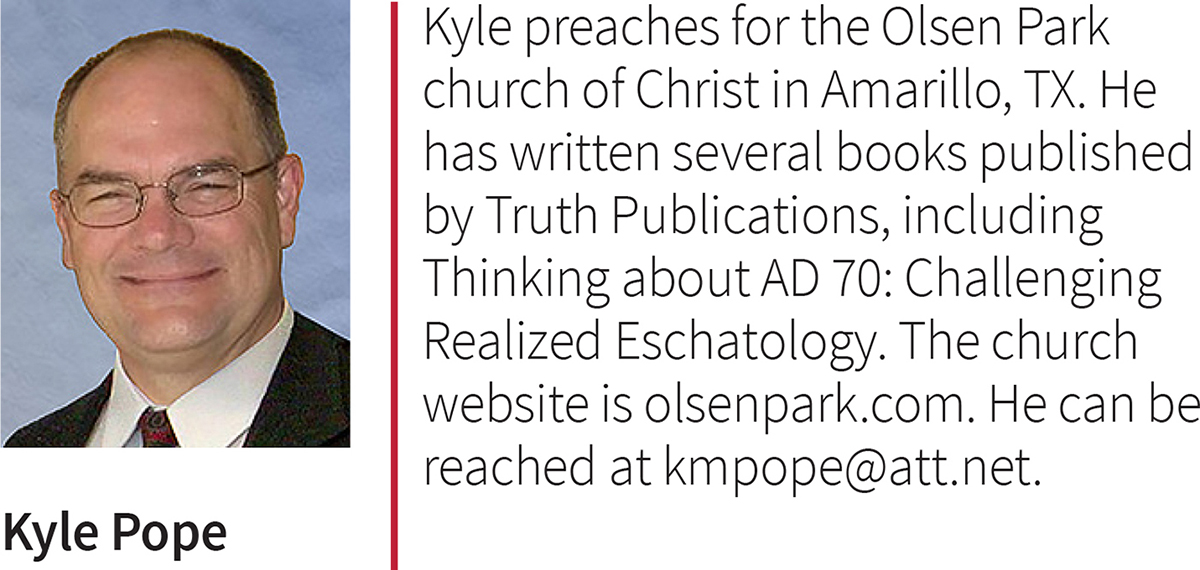by Kyle Pope
Synopsis: In life and matters of faith, when people use the same words with different concepts in mind, the result is confusion and chaos. This makes it crucial that in biblical interpretation, we allow the Bible to define its own terms.
According to All Things Linguistic, a blog focusing on interesting language issues, the phrase used as the title of this article has proven, in some situations, to be anything but “no problem.” Apparently, if you are a “baby boomer” (i.e., one born between 1946-1964), the most common way you respond to an expression of gratitude is to say “you’re welcome,” while you generally only use the phrase “no problem,” to reassure someone that an action they have taken has not inconvenienced you. On the other hand, if you are a “millennial” (i.e., one reaching adulthood after the year 2000), the phrase “you’re welcome” is only used sarcastically when you haven’t been thanked or when you feel that something was done to you or taken from you without your permission. To you, the phrase “no problem” is considered the most polite and respectful response to the words “thank you.” While the same words are used, dramatically different meanings are attached to them depending upon the perspective of the speaker and the hearer. For those who work in customer service, this has proven quite problematic, “because everyone thinks that everyone else is being rude when they’re really being polite in their own language.”
Often in matters of faith, this same problem arises when people use the same words but in ways far different from their meaning in Scripture. Consider a few examples:
To many in the world, the term “baptism” can refer to any type of initiatory ritual involving water, including sprinkling, pouring, and full or partial immersion. In the New Testament, baptism is something accomplished when one goes “down into the water” (Acts 8:38) and then comes “up out of the water” (Acts 8:39). It requires “much water” (John 3:23) and symbolizes being “buried with” Christ “through baptism” and raised by faith in Him (Rom. 6:4; Col. 2:12). Sprinkling and pouring do not demonstrate the figure of burial. In the Greek Old Testament, the verb form was used of the Syrian commander, Naaman, dipping seven times in the Jordan in obedience to Elisha’s command that he might be cleansed of his leprosy (2 Kings 5:1-14). So, as the Bible defines it, “baptism” is always—and only—full immersion.
When many speak of a “church,” they are describing a building or one of many distinct denominations holding to a particular system of doctrine and practice. Jesus promised to build His church (Matt. 16:18). Following His death, burial, resurrection, and ascension, followers of Jesus were collectively described as “the church” (Acts 5:11; 8:1, 3). As the New Testament uses this word, it always applies to a collection of people and never to a building. While it may speak of different groups of Christians in various places as “churches” (Acts 9:31; 15:41; 16:5), these were not divided into denominations believing and practicing different things. Individual disciples of Christ collectively constitute “one faith” (Eph. 4:5) and “one body” (Eph. 4:4; Rom. 12:5; 1 Cor. 10:17; 12:12, 13; Eph. 2:16; Col. 3:15), which is defined as “the church” (Eph. 5:23; Col. 1:18, 24).
For many, the “pastor” is the main preacher serving a congregation who acts as the unilateral leader over the group. In the New Testament, the word means “shepherd,” as it is translated most often (Matt. 9:36; 25:32; 26:31; Mark 6:34; 14:27; Luke 2:8, 15, 18, 20; John 10:2, 11, 12, 14, 16; Heb. 13:20; 1 Pet. 2:25). In the New Testament, only once, in Ephesians 4:11, is it translated “pastors” in the plural. Based on the synonymous use of its verb form with “elders” (or presbyters) and “overseers” (or “bishops”) (cf. 1 Pet. 5:1-5), it becomes clear that the term “pastors” is one of several names used for the group of qualified, appointed men who lead local congregations (cf. 1 Tim. 3:1-7; Titus 1:5-11; Phil. 1:1). While a qualified preacher may serve as one of the “pastors” (1 Tim. 5:17), the New Testament never speaks of a single “pastor” over a local congregation.
To Premillennialists, Christ’s promised “kingdom” is a geopolitical material domain that will one day be established on earth when Christ visibly and physically reigns upon His throne in Jerusalem. Indeed, the Bible speaks of geopolitical kingdoms, such as that of Solomon. He reigned over “all kingdoms from the River to the land of the Philistines, as far as the border of Egypt” (1 Kings 4:21). However, the Messiah was said to reign over a far different jurisdiction. Daniel was told that the Messiah’s kingdom would arise during a fourth great kingdom—the Roman Empire. It would “consume” all kingdoms and “stand forever” (Dan. 2:44). Following Jesus’s resurrection, He was said to have “all authority” in a realm including heaven and earth (Matt. 28:18). After the day of Pentecost, His disciples were said to have been “conveyed”—“into the kingdom” of God’s son (Col. 1:13). They describe Jesus as “King of kings and Lord of lords” (1 Tim. 6:15), proclaiming Him to presently reign “far above all principality and power and might and dominion, and every name that is named, not only in this age but also in that which is to come” (Eph. 1:21). As the New Testament describes it, the Messiah’s kingdom is a spiritual realm that already exists in heaven and earth over those who follow Him as King.
To Preterists, the “resurrection” was the deliverance of righteous souls from Hades upon Jesus’s death, the destruction of Jerusalem, or a direct elevation of the righteous to heaven upon death. Scripture speaks of the figurative resurrection of Israel back to its national existence in the land of Israel (Ezek. 37:1-14) and the spiritual death and resurrection to life that occurs in baptism (Rom. 6:1-7). Still, all figures derive their significance from something actual. This becomes clear in the relationship that is drawn between Christ’s resurrection and the promise given to His people. Paul argued that what Jesus experienced—“He was buried” and “He rose again the third day” (1 Cor. 15:4)—stands as proof of what will one day happen to us (cf. 1 Cor. 15:12-19). His was not merely spiritual deliverance of His soul from Hades, but a reunion of His spirit with an incorruptible body (cf. 1 Cor. 15:43; Phil. 3:21). There is a likeness in kind. Jesus’s resurrection was the “firstfruits” of what His people will experience “at His coming” (1 Cor. 15:20). Paul explained, “if the Spirit of Him who raised Jesus from the dead dwells in you, He who raised Christ from the dead will also give life to your mortal bodies through His Spirit who dwells in you” (Rom. 8:11). As the New Testament teaches it, the resurrection that will occur at the final judgment is a reunion of the spirit to a resurrected body that (for the righteous) is similar in kind to the resurrection body of Jesus.
People can use the same words, but unless the meaning attached to those words is the same, there will be confusion. Like the example we offered at the beginning of this study, someone can say “no problem,” but a problem can arise if we mean different things by using even such a simple phrase. In spiritual matters, we must always allow Scripture to set its definitions. Otherwise, we may find ourselves using the same words but with meanings never used by the Holy Spirit. When this happens, the result will be error and confusion.
“‘No Problem’ vs ‘You’re Welcome.’” All Things Linguistic. July 16, 2015. https://allthingslinguistic.com/post/124189121619/no-problem-vs-youre-welcome.


